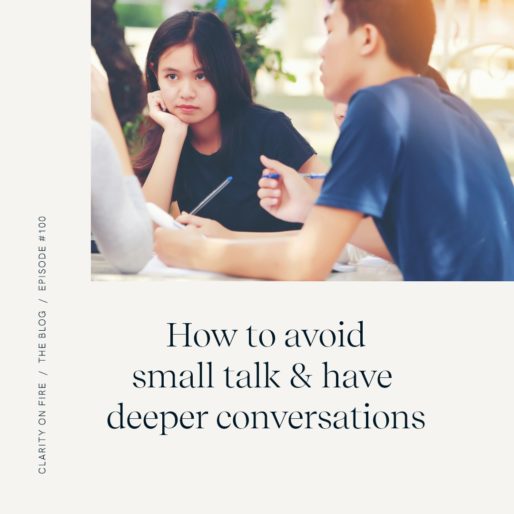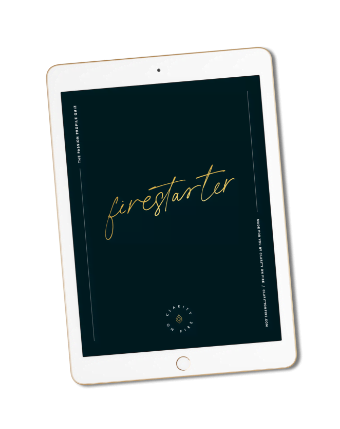Click the play button below, or subscribe and listen through our podcast on iTunes, Stitcher, Google Play, or Spotify.
Podcast: Play in new window | Download
I don’t know if it’s my face (whatever the opposite of ‘resting bitch face’ is, I have that) or my overall demeanor or what, but I must have an invisible sign hanging around my neck that says, “Hello stranger! Please strike up a conversation with me.”
This happens to me everywhere, including (no kidding) while I’m changing in the women’s locker room at the gym. I can’t even avoid it when I’m half-dressed!
The other day at yoga, I was in a crappy mood and I actively tried to put off a “don’t talk to me” vibe because I just wanted to be left alone. Three women separately approached me after class to strike up a conversation. I had to laugh.
So I give up! I accept that this is just the way I am.
And mostly, I don’t mind it so much. I like hearing people’s stories (I mean, it’s what my entire job is centered around, after all!), and I’ve met some really cool people because of this superpower/curse of mine.
The only real problem is that I hate small talk.
Having endless polite, surface-level, meaningless conversations with strangers is my idea of “the bad place.” (Shudder.)
So, since I end up talking to random people all the time, it’s been crucial for me to figure out how to dive straight into the conversation deep-end, to avoid the awful awkwardness of small talk.
I’ll get into my four strategies momentarily, but I want to preface them by saying that…
THESE WILL HELP YOU HAVE BETTER, DEEPER CONVERSATIONS WITH EVERYONE, NOT JUST STRANGERS
Many of my clients complain about not having the depth of connections they really want in their friendships, romantic relationships, family dynamics, etc. They desperately want to find their tribe, but are feeling lost about how to get the level of emotional intimacy they’re craving.
That’s totally normal! Most of us aren’t taught how to connect with others on a deep level, yet it’s what we want more than anything.
So if you’ve been struggling to find “your people,” or develop your relationships past a certain point, these strategies for avoiding small talk will help just as much with your established relationships as with total strangers.
OK, so let’s get into it:
1. ASK BETTER QUESTIONS
The quality of your conversations starts with the quality of your questions.
Most of us are asking surface-level questions in the hopes of getting to deeper answers, and feeling frustrated by the lack of substance in our interactions.
I define surface-level questions as those with a one-word (or short-phrase) answer. Any question that can be answered with a simple “yes,” “no,” “sure,” “fine,” or other single word are unlikely to stir up an interesting conversation.
Simply rephrasing a question to make it more open-ended and thought-provoking can make all the difference in shifting a conversation from lame small talk to deep and engaging.
Need some examples? How about…
Instead of asking, “How are you doing?” … ask, “What’s been on your mind lately?”
Instead of, “Do you have kids?” … try, “Tell me about your family.”
Instead of the rote question, “What do you do for work?” … ask, “What do you love about your work?”
These questions are essentially asking the same thing, but the way you ask them changes the whole energy of the conversation and invites people to open up. You’ll be amazed at how much deeper and more interesting your conversations will become when you try this.
OK, so now that you’re rephrasing your questions to be more open-ended, the next thing to try is:
2. AVOID THE OBVIOUS TOPICS
Most people, out of habit, go for the obvious, cliché topics (work, the weather, or just generally asking, “How’s it going?”) … which leads to rote, stale responses.
It’s boring to constantly talk about the same things, so when you bring up those topics, people will mentally check out of the conversation before it even really got started.
For example, how tired are you of the question, “So what do you do?”
Ugh, so dull and one dimensional.
I get why people ask this question when they first meet someone, but it rarely leads to a stimulating conversation.
That’s because when people are asked about the same things over and over, they start to formulate canned responses.
It doesn’t matter whether you love your work or hate everything about your job, you probably have a go-to answer to that question ready in your back pocket. Which means you’re just repeating what you’ve said countless times before and not fully engaging in the conversation.
For example, I’ve had this exact same conversation hundreds of times:
Random stranger: “So what do you do?”
Me: “I have my own business.”
Stranger: “Oh yeah? What kind of business?”
Me: “I do life and career coaching.”
Stranger: “Wow, that’s so interesting!”
Me: “Yep, I enjoy it.”
(…crickets…)
Instead, I challenge you to avoid the obvious topics as much as possible. Remember that people are complex and nuanced and multi-dimensional, and they can be a wealth of fascinating stories and ideas if you know how to open them up.
So try asking about their hobbies, or their family, or their pet (people with pets can talk about them for days), or what’s inspiring them lately, or what shows/books/podcasts they’re currently obsessed with, or what trips they have planned (or wish they could take), or what their kid-self wanted to be when they grew up, or what they’d do if they won the lottery, or what causes are firing them up lately.
(For more interesting conversation-starting questions, check out Rachel’s previous blog called, For the love of god, stop asking people, “So, what do you do?”)
Not only are you likely to have much more interesting conversations if you go for these kinds of non-obvious topics, but you’ll get to know the person on a deeper level.
Look, I’m not saying you should NEVER ask about someone’s work (or the weather, or whatever other cliché subject), but if you ARE going to talk those obvious topics, go back to Step 1 and at least start asking more interesting questions about them.
3. AVOID THE “ME TOO” EFFECT
And no, I’m not referring to the #metoo movement here.
When someone shares a story with you, it’s tempting to jump in with, “I had a similar experience!” or “That reminds of when _______ happened to me!”
It makes sense why we want to do this, because it feels like we’re relating to the other person. As in, “See, we’ve had similar experiences!”
But if you’re always turning the conversation back to yourself — even if your intention isn’t a selfish one, but a genuine desire to connect — it makes the other person feel like you’re not really listening to them.
You can share your similar experiences, of course, but first allow the other person to fully tell their story. Listen, ask questions, and demonstrate that you’re genuinely curious to hear it all.
Oftentimes, there’s a lot more to someone’s experience — how it felt, how it changed them, what they learned, who it brought into their life, etc. — that they would’ve been willing to open up about, but if you jump too quickly to your own related story, you cut off the potential for that deeper, more intimate conversation.
When you’re tempted to jump in with a “that happened to me too!” story, do this instead:
4. PRACTICE BEING A BETTER LISTENER
In all my conversations with strangers, I’ve learned that most people LOVE talking about themselves if they have a captive audience. If you’re a good listener, people will tell you things about themselves they hardly share with anyone.
So if you want deeper connections and more interesting conversations, you’ve got to practice being a better listener.
Here are a few rules for being a good listener:
- Ask good questions (which we’ve already discussed).
- Don’t interrupt: This one sounds obvious, but if you pay attention to how much you interrupt or talk over other people, you might be surprised. Most of us do this way more than we realize.
- Prove you’ve been really listening: The best way to do this is to repeat back your interpretation of what they just described. When someone shares a story with you, and you say something like, “It sounds like you were really overwhelmed,” or “Wow, that must have been so scary,” they’ll feel incredibly heard and understood. So simple, but so powerful!
Now I’d love to hear from you. Do you hate small talk as much as me? Have you felt frustrated that your conversations aren’t as deep as you’d like? Which of these strategies do you want to try first? Leave me a comment to let me know how this resonates with you!
Much Love,
Kristen (& Rachel)
IF YOU LIKED THIS, YOU SHOULD ALSO CHECK OUT…
For the love of god, stop asking people, “So, what do you do?”
How to find your tribe and grow a network with Carolyn Birsky



Love this! My first week of college. I got to experience a similar “experiment”. To become a better “listener”, we had to have a conversation with someone without responding with “I/me”. That allowed for the conversation to still focus on what the other person said and not jump straight into “our experience”. If you try it, it is actually very hard and made us think!!
I love that they had you try this in college! What a great teacher. And it’s much harder than it sounds to focus solely on the other person without saying “me/I,” right?? But it really does help you practice deeper listening. Thanks for sharing this interesting experiment!
Okay, but how do you ask these questions without coming off blunt and rude? If I have to ask surface level questions, I don’t even try. I don’t see the point, but when I try to dig deeper and have interest in the person, the person is always put ‘off guard’. I often feel like I just walked up to them and slapped them across the face, or that is what their expression says. My partner tells me that it’s my personality and they are just put off-guard because I am too straightforward and say it how it is, that people are more comfortable with talking about weather than talking about their actual passions. So, how do I dig deeper without them looking like I slapped them across the face?
Great question, Elena! You’re right, some people are so caught off guard by deeper questions (because they’re so used to small talk) that you might take them a bit by surprise. I do think there are ways of asking deeper questions that comes across as genuinely friendly, curious, and approachable, but even still, some people are going to look at you like you have two heads. The truth is — those aren’t your people! You sound like someone who really values depth and honesty (which is awesome!), and other people who value the same things will find your straightforwardness a breath of fresh air. But not everyone will, and that’s OK! You don’t need to make deep connections with anyone and everyone — just the people who will appreciate you and your personality.